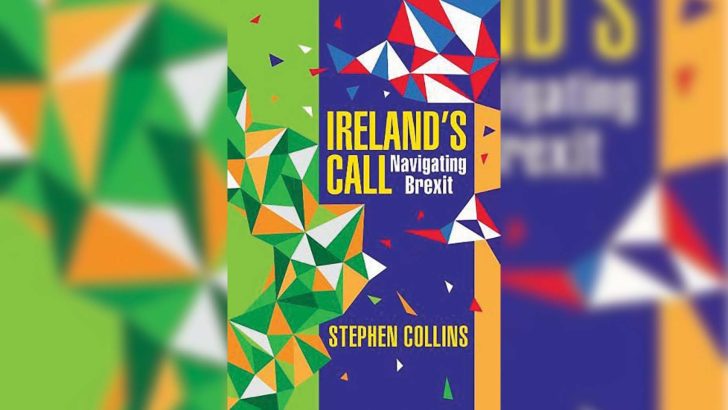Ireland’s Call: Navigating Brexit, by Stephen Collins (Red Stripe Press / Orpen Press, €19.99 / £19.99)
This new book by the Irish Times political columnist is a splendid account of how Brexit was hatched and has become a matter of grave contention.
One of the main sources for Stephen Collins’ book is the diary of Michel Barnier, the European Union’s chief negotiator. Barnier daily recorded from his perspective the twists and turns of the Brexit negotiations. Informative interviews with the leading members of the Irish side of the negotiations helped Collins to colour in the Irish perspective on the proceedings. Extensive quotes from Gavin Barwell, one of the chief British negotiators, also go towards ensuring a balanced treatment of the subject.
Collins in his treatment heads each chapter with an apposite quotation. He begins by explaining how contrary to expectations the British electors voted for Brexit. The title of this chapter reads: ‘Our work has been taken by thousands and thousands of immigrant’s crossing over into Britain’. Quote from an elderly man in a Mayo jersey in London explaining why he intended to vote Leave.
Issue
Clearly the issue that loomed large was immigration and this was not lost on Boris Johnson and his supporters in the European Research Group. Their success in the referendum was due in no small measure to their vowing to initiate a radical solution to the difficulties arising from immigration.
In the Brexit negotiations the EU negotiators faced two well-known ploys dear to British negotiators. The first is the practice whereby the British quality press in reporting on negotiations being conducted by Great Britain would suggest a result favourable to Britain to be a foregone conclusion.
The second ploy is to insist that parties first sort out the more malleable issues in a negotiation, while leaving the crucial and most difficult issue until the end. Then with most of the negotiations settled immense pressure is extended on the other party to agree to the most difficult and crucial issue on British terms.
The first British ploy merely irritated the EU negotiators. They then succeeded in standing firm against the second. This was achieved because the Irish negotiators were determined that the border between the EU and the UK would not run across the island of Ireland, but at the Northern Ireland seaports and that this issue should take precedence over all others. And notwithstanding British efforts to undermine their solidarity with Ireland on the issue the entire membership of the EU supported the Irish stand.
Collins heads his chapter on the British response to the Brexit treaty with Prime Minister Boris Johnson saying to Taoiseach Michael Martin: ‘I made a terrible mistake. We never realised that the protocol was going to be so onerous’!
Negotiations
So not long after the conclusion of the Brexit negotiations, the UK attempted to set out on new negotiations. The EU response was that the Brexit negotiations had reached an agreed conclusion and the Brexit Treaty as any international treaty, was to be respected by both parties to it.
Moreover, the EU negotiators also indicated their readiness to discuss and deal with unexpected difficulties and unforeseen anomalies arising from the treaty. However, Boris Johnson and the British government merely initiated a course of action calculated to nullify the Brexit Treaty.
Thus in a gloomy concluding chapter Collins predicts that this can lead only to continuing acrimony and a possible trade war between the UK and the EU.
Throughout, Collins for the most part links the unprincipled approach of the UK to the Brexit negotiations to that characteristic of Boris Johnson. And in an epilogue he charts Johnson’s duplicitous rise to the top of politics in the UK and his ignominious dismissal by his peers for serial lying. It remains to be seen if we have seen the last of him in No. 10.



